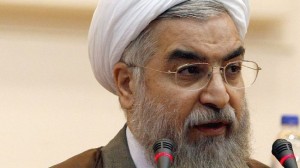 Tensions between Iran’s hardliners and the centrist government of Hassan Rouhani erupted publicly on Wednesday when the state broadcaster blocked the president’s live address to the nation for an hour but backtracked after the president took the row to Twitter.
Tensions between Iran’s hardliners and the centrist government of Hassan Rouhani erupted publicly on Wednesday when the state broadcaster blocked the president’s live address to the nation for an hour but backtracked after the president took the row to Twitter.
While many Iranians were waiting for the speech, state-run television aired songs from the 1979 revolution to mark the 35th anniversary of the upheaval without explaining the delay.
Mr Rouhani resorted to social media, tweeting: “Head of Islamic Republic of Iran Broadcasting [IRIB}, [Ezzatollah] Zarghami, prevented live discussion w/ people on IRIB1 which was scheduled for an hour ago.” Shortly afterwards, the network broadcast his speech with no explanation of what had happened beyond an apology from Mr Rouhani for the delay.
The government is under growing pressure from hardliners over domestic politics and the nuclear deal that was agreed with major powers. Reform-minded analysts say the power struggle is becoming increasingly tense ahead of parliamentary elections scheduled for two years time.
In another apparent attempt to intimidate one of the president’s supporters, Sadegh Zibakalam, a well-known politics professor at Tehran University who had expressed doubts about the nuclear programme, was summoned to appear before the country’s hardline judiciary on Wednesday.
He was accused of “weakening” and “propagating against” the Islamic regime for questioning whether its nuclear programme was necessary. The programme has been subject to wide-ranging international sanctions that have crippled the economy.
Prof Zibakalm’s summons came a day after a frustrated Mr Rouhani denounced his opponents as lacking the knowledge to criticise the interim nuclear agreement that Iran reached in November with the US, UK, France, Russia, China and Germany. The president also asked why supporters have been afraid to praise the deal publicly. Under the terms of the agreement, Tehran has restricted its uranium enrichment activities in return for modest relief of sanctions.
“Why should illiterate people who receive money from certain places be able to criticise [the deal] but the educated elite and university professors remain quiet? Why do professors have to write private letters to the president when an international event [nuclear deal] happens? Why can they not shout?” Mr Rouhani asked.
But the president stayed calm in his live broadcast to the nation, hailing the government’s foreign policy achievements to date and saying the nuclear deal was making foreign dignitaries “line up” to come to Tehran.
Analysts believe Ayatollah Ali Khamenei, Iran’s supreme leader and ultimate decision maker, has largely curbed hardliners in the Revolutionary Guards, the judiciary and the parliament to prevent them from sabotaging the deal.
“The supreme leader still holds the key of the cage where hardliners are locked,” said a western diplomat in Tehran. But analysts say Mr Rouhani’s opponents continue to undermine him whenever they can in an effort to score political points.
After five hours of interrogation on Wednesday, Prof Zibakalam was released on bail. No date has been given for his trial.
“I asked a question of those who say the nuclear deal is disgraceful: what has been the direct and indirect cost of the nuclear programme over the past 10 years to the country’s growth and economic development?” said Prof Zibakalam. “I see no benefit.”
The professor recently sent two open letters to Hossein Shariatmadari, managing director of Kayhan, a hardline newspaper, questioning the value of the nuclear programme for a country with 5-6m unemployed, which faces environmental crises and has per capita spending on education and healthcare “at the level of African and under-developed states”.
Mr Shariatmadari on Wednesday lashed out at the president for his speech. The critics of the government were senior clerics, university professors and nuclear experts, he said.
“In the Geneva [nuclear] agreement, the only noticeable achievement is that the US proved [once again] it is untrustworthy,” he said. “The bitter facts of the [nuclear] agreement will be revealed in the not-too-distant future.”
By The Financial Times
The Iran Project is not responsible for the content of quoted articles.

 QR code
QR code